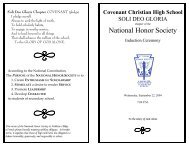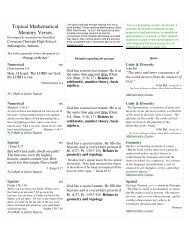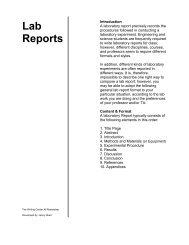Ten Biblical reasons to be part of a local church - Covenant ...
Ten Biblical reasons to be part of a local church - Covenant ...
Ten Biblical reasons to be part of a local church - Covenant ...
Create successful ePaper yourself
Turn your PDF publications into a flip-book with our unique Google optimized e-Paper software.
<strong>Ten</strong> <strong>Biblical</strong> <strong>reasons</strong> <strong>to</strong> <strong>be</strong> <strong>part</strong> <strong>of</strong> a <strong>local</strong> <strong>church</strong><br />
#1-7 adapted from Blest <strong>be</strong> the Tie that Binds Don Kistler on Church Mem<strong>be</strong>rship<br />
– from “Protestants Affirm the Church”, a Soli Deo Gloria publication<br />
We know that the <strong>church</strong> is not a new invention. The Greek word <strong>of</strong>ten translated “<strong>church</strong>” referred <strong>to</strong><br />
God’s people in the Old Testament as well. Acts 7:38 speaks <strong>of</strong> “the <strong>church</strong> in the wilderness” (KJV)<br />
during the time <strong>of</strong> Moses and the exodus. However a new way <strong>of</strong> referring <strong>to</strong> God’s people was<br />
introduced in Paul’s epistles. We are the body <strong>of</strong> Christ. According <strong>to</strong> Eph. 5:30 “we are mem<strong>be</strong>rs <strong>of</strong><br />
His body.”<br />
Today we speak <strong>of</strong> the <strong>church</strong> in two ways: visible or invisible. The invisible <strong>church</strong> consists <strong>of</strong> all true<br />
<strong>be</strong>lievers throughout all <strong>of</strong> his<strong>to</strong>ry. Mem<strong>be</strong>rship <strong>to</strong> this is known only by God. The visible <strong>church</strong> is the<br />
covenant community that is recognized as Christians who gather <strong>to</strong>gether as <strong>local</strong> bodies.<br />
There is good reason and inference from Scripture that God expects pr<strong>of</strong>essing <strong>be</strong>lievers <strong>to</strong> hold their<br />
mem<strong>be</strong>rship in a <strong>local</strong> body:<br />
1. The New Testament <strong>church</strong>es were <strong>local</strong>, visible <strong>church</strong>es. They met in specific places.<br />
– Acts 11:26 tells us that the <strong>church</strong> in Antioch, where the disciples were first called<br />
“Christians,” assembled <strong>to</strong>gether for the purpose <strong>of</strong> <strong>be</strong>ing taught. They were gathered<br />
<strong>to</strong>gether as a <strong>church</strong>.<br />
– Paul wrote his epistles <strong>to</strong> specific <strong>church</strong>es in specific locations, with pas<strong>to</strong>rs and elders<br />
shepherding their flocks. E.g. 1 Cor. 1:2; 2 Cor. 1:1, Gal 1:2; 1 Thess. 1:1; 2 Thess. 1:1.<br />
2. The <strong>local</strong> <strong>church</strong> is God’s <strong>to</strong>ol for bringing His people <strong>to</strong> full maturity in knowledge and faith.<br />
Eph. 4:11-13: “He gave some as pas<strong>to</strong>rs and teachers, for the equipping <strong>of</strong> the saints for the work<br />
<strong>of</strong> service, <strong>to</strong> the building up <strong>of</strong> the body <strong>of</strong> Christ; until we all attain <strong>to</strong> the unity <strong>of</strong> the faith, and<br />
<strong>to</strong> the knowledge <strong>of</strong> the Son <strong>of</strong> God, <strong>to</strong> a mature man” (NASB). These are actual pas<strong>to</strong>rs and<br />
teachers who are equipping <strong>be</strong>lievers. Acts 14:21-23 says that “The apostles taught, and<br />
appointed elders for every <strong>church</strong>.” See also Titus 1:5.<br />
3. The Great Commission points <strong>to</strong> <strong>church</strong> mem<strong>be</strong>rship (Matt. 28:18-20). Baptism, a sacrament <strong>of</strong><br />
the <strong>church</strong>, is administered by one who is commissioned by a <strong>church</strong> body. Discipling and<br />
teaching <strong>to</strong> <strong>be</strong> o<strong>be</strong>dient are also properly done in the context <strong>of</strong> a <strong>church</strong> with an ordained leader<br />
(elder) and a duly constituted <strong>church</strong> body.<br />
4. Christ said that He would build His Church (Matt. 16:18). This is the only thing Jesus said He<br />
would build – not a seminary, high school, hospital, or baseball field. Yes, He is speaking about<br />
the true Church, comprised <strong>of</strong> all true mem<strong>be</strong>rs <strong>of</strong> Christ’s mystical body, but those mem<strong>be</strong>rs<br />
meet somewhere; they are taught somewhere; they worship <strong>to</strong>gether somewhere; and when they<br />
do so they are a <strong>local</strong> manifestation <strong>of</strong> the larger reality <strong>of</strong> Christ’s Church, His Body. True<br />
Christians want <strong>to</strong> <strong>be</strong> a <strong>part</strong> <strong>of</strong> what Christ is building. Believers want <strong>to</strong> manifest their<br />
association with Christ and His Church in any and every way possible.<br />
5. The Church is one <strong>of</strong> two organisms divinely instituted by God for the spreading <strong>of</strong> His love and<br />
His gospel. One is the <strong>church</strong>; the other is the family. Mem<strong>be</strong>rship is not optional in either one.<br />
By virtue <strong>of</strong> <strong>be</strong>ing physically alive, we are mem<strong>be</strong>rs <strong>of</strong> a <strong>part</strong>icular family. We are not simply<br />
mem<strong>be</strong>rs <strong>of</strong> ‘the family <strong>of</strong> man,’ but we are also mem<strong>be</strong>rs <strong>of</strong> an individual, specific, <strong>local</strong> family.<br />
By virtue <strong>of</strong> <strong>be</strong>ing spiritually alive – born again or regenerated – we are mem<strong>be</strong>rs <strong>of</strong> the invisible<br />
Church, the family <strong>of</strong> God, and therefore must join ourselves with the actual reality <strong>of</strong> that<br />
concept, namely the <strong>local</strong> <strong>church</strong>.
The Old Testament practice <strong>of</strong> mem<strong>be</strong>rship certainly shows the importance <strong>of</strong> this affiliation.<br />
Being an Israelite was not simply an issue <strong>of</strong> race and nationality, but an issue <strong>of</strong> <strong>be</strong>ing in<br />
covenant bond with God. Romans 9:6: “For they are not all Israel who are descended from<br />
Israel.” What made someone a true Israelite was his relationship with the living God.<br />
God commanded circumcision as the sign <strong>of</strong> acceptance in<strong>to</strong> the covenant community (Gen.<br />
17:7-10). In fact, God nearly killed Moses for not circumcising his male child. Abraham was<br />
not a Jew by birth, but by circumcision. Baptism is now the New Testament sign <strong>of</strong> acceptance<br />
in<strong>to</strong> the covenant community (Col. 2:11). There was not only <strong>to</strong> <strong>be</strong> an inward reality, a<br />
circumcision <strong>of</strong> the heart, but an outward sign <strong>of</strong> that invisible reality. Time and time again God<br />
calls for an outward show <strong>of</strong> what has happened internally. Good works do not save, but they<br />
are visible evidence that a work <strong>of</strong> grace has taken place in the heart.<br />
6. God’s people are repeatedly called <strong>to</strong> a visible place throughout Scripture. Nehemiah 1:8-9: “I<br />
will gather them from there and will bring them <strong>to</strong> the place where I have chosen <strong>to</strong> cause My<br />
name <strong>to</strong> dwell.” The people He is gathering are His servants and the people whom He redeemed<br />
by His great power and His strong hand (Neh. 1:10).<br />
This was not a rote, empty religious practice, but it was a joy for those involved.<br />
– Psalm 26:8 “O LORD, I love the habitation <strong>of</strong> Your house and the place where Your<br />
glory dwells.”<br />
– Psalm 27:4 “One thing I have asked from the LORD, that I shall seek: That I may dwell<br />
in the house <strong>of</strong> the LORD all the days <strong>of</strong> my life, <strong>to</strong> <strong>be</strong>hold the <strong>be</strong>auty <strong>of</strong> the LORD and<br />
<strong>to</strong> meditate in His temple.”<br />
– Psalm 84:1 “How lovely are Your dwelling places, O LORD <strong>of</strong> hosts!”<br />
7. Much <strong>of</strong> the Bible cannot <strong>be</strong> o<strong>be</strong>yed without <strong>be</strong>longing <strong>to</strong> a <strong>church</strong> as a mem<strong>be</strong>r. Appreciating<br />
those who have charge over you (1 Thess. 5:13) is not possible if you are not in some <strong>of</strong>ficial<br />
way under someone. Hebrews 13:17: “O<strong>be</strong>y your leaders and submit <strong>to</strong> them, for they keep<br />
watch over your souls.”<br />
8. When I asked my students if they had any input in<strong>to</strong> this <strong>to</strong>pic Matt Fields replied, “chicks.” It is<br />
true that the directive “Don’t <strong>be</strong> unequally yoked” (2 Cor. 6:14) <strong>be</strong>comes a lot more feasible if<br />
you spend time with like-minded <strong>be</strong>lievers. You are much more likely <strong>to</strong> find a godly, <strong>church</strong>going<br />
companion, who has learned the pattern for marriage from the ideal <strong>of</strong> Christ and the<br />
<strong>church</strong> (see Eph. 5:22-33), by getting <strong>to</strong> know those who actually see it as a priority <strong>to</strong> <strong>be</strong>long <strong>to</strong><br />
a <strong>church</strong>.<br />
9. Belong <strong>to</strong> a <strong>church</strong> <strong>be</strong>cause it is commanded by God. Heb. 10:24-25 “Don’t give up meeting<br />
<strong>to</strong>gether.” How did they meet <strong>to</strong>gether? As mentioned above they met <strong>to</strong>gether with pas<strong>to</strong>rs and<br />
elders who faithfully guarded knowledge and instruct people (see also Malachi 2:7-9; 2 Tim.<br />
1:11,14)<br />
10. We should generally have the same view <strong>of</strong> things as Jesus. Eph. 5:25 says that “Christ loves the<br />
<strong>church</strong>.” So should we. How can we demonstrate this without <strong>be</strong>ing <strong>part</strong> <strong>of</strong> a <strong>local</strong><br />
congregation? Love the <strong>church</strong> <strong>be</strong>cause Christ does.<br />
He bought the <strong>church</strong> with His own blood (Acts 20:28). He gave up his life for the <strong>church</strong> (Eph.<br />
5:25). We ought not speak deroga<strong>to</strong>rily <strong>of</strong> something God has so highly esteemed.<br />
#1-7 were organized from Blest <strong>be</strong> the Tie that Binds by Don Kistler (pg 96-105). This is a chapter from<br />
Kistler, Don edi<strong>to</strong>r. Onward, Christian Soldiers: Protestants Affirm the Church. Morgan, PA: Soli Deo Gloria Publications, 1999.











